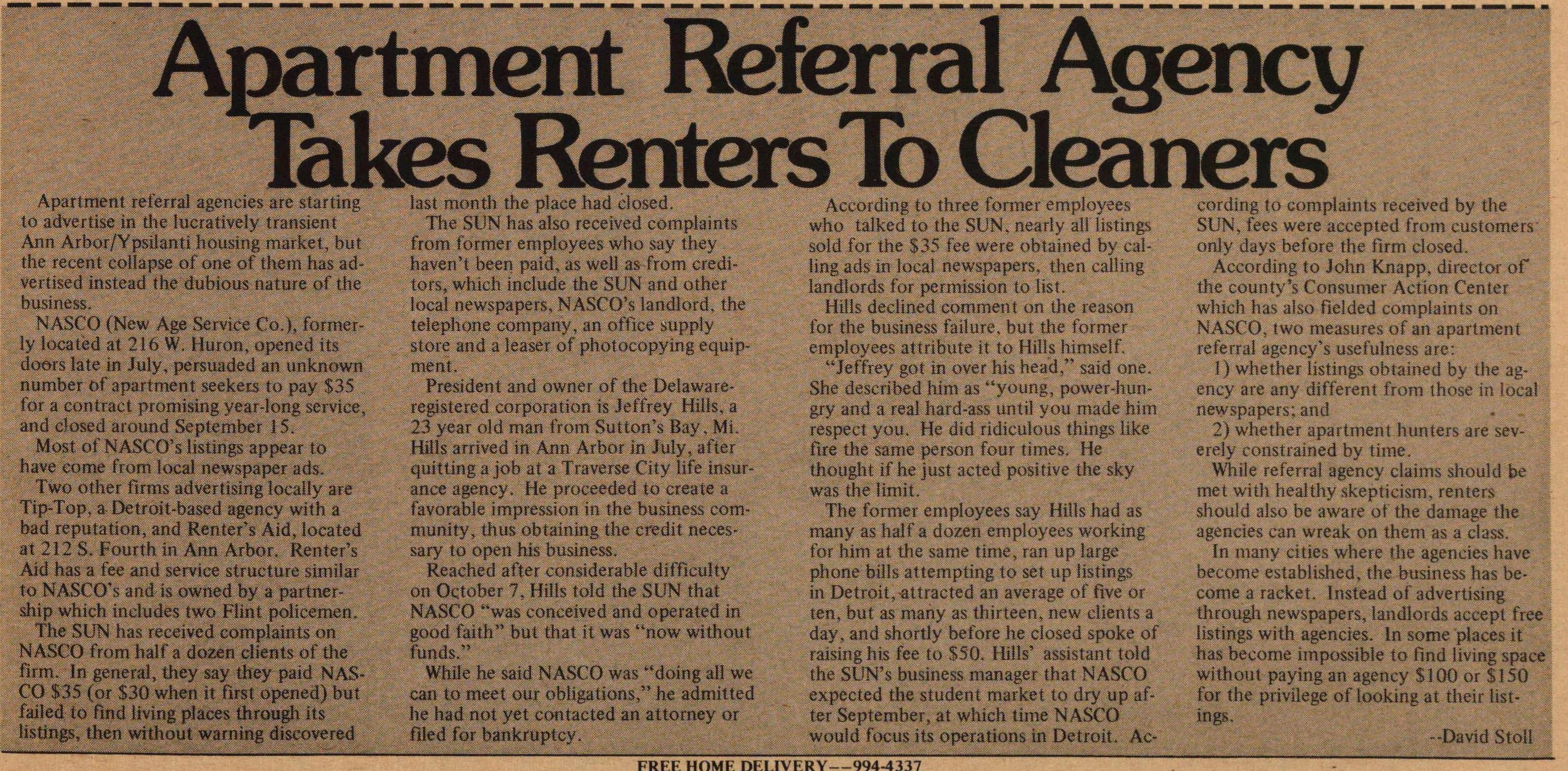Apartment Referral Agency Takes Renters To Cleaners

Apartment referral agencies are starting to advertise in the lucratively transient Ann Arbor/Ypsilanti housing market, but the recent collapse of one of them has advertised instead the dubious nature of the business.
NASCO (New Age Service Co.), formerly located at 216 W. Huron, opened its doors late in July, persuaded an unknown number of apartment seekers to pay $35 for a contract promising year-long service, and closed around September 15.
Most of NASCO's listings appear to have come from local newspaper ads.
Two other firms advertising locally are Tip-Top, a Detroit-based agency with a bad reputation, and Renter's Aid, located at 212 S. Fourth in Ann Arbor. Renter's Aid has a fee and service structure similar to NASCO's and is owned by a partnership which includes two Flint policemen.
The SUN has received complaints on NASCO from half a dozen clients of the firm. In general, they say they paid NASCO $35 (or $30 when it first opened), but failed to find living places through its listings, then without warning discovered last month the place had closed.
The SUN has also received complaints from former employees who say they haven't been paid, as well as from creditors, which include the SUN and other local newspapers, NASCO's landlord, the telephone company, an office supply store and a leaser of photocopying equipment.
President and owner of the Delaware-registered corporation is Jeffrey Hills, a 23 year old man from Sutton's Bay, Mi. Hills arrived in Ann Arbor in July, after quitting a job at a Traverse City life insurance agency. He proceeded to create a favorable impression in the business community, thus obtaining the credit necessary to open his business.
Reached after considerable difficulty on October 7, Hills told the SUN that NASCO "was conceived and operated in good faith" but that it was "now without funds."
While he said NASCO was "doing all we can to meet our obligations," he admitted he had not yet contacted an attorney or filed for bankruptcy. According to three former employees who talked to the SUN, nearly all listings sold for the $35 fee were obtained by calling ads in local newspapers, then calling landlords for permission to list.
Hills declined comment on the reason for the business failure, but the former employees attribute it to Hills himself.
"Jeffrey got in over his head," said one. She described him as "young, power-hungry and a real hard-ass until you made him respect you. He did ridiculous things like fire the same person four times. He thought if he just acted positive the sky was the limit."
The former employees say Hills had as many as half a dozen employees working for him at the same time, ran up large phone bills attempting to set up listings in Detroit, attracted an average of five or ten, but as many as thirteen new clients a day, and shortly before he closed spoke of raising his fee to $50. Hills' assistant told the SUN's business manager that NASCO expected the student market to dry up after September, at which time NASCO would focus its operations in Detroit. According to complaints received by the SUN, fees were accepted from customers only days before the firm closed.
According to John Knapp. director of the county's Consumer Action Center which has also fielded complaints on two measures of an apartment referral agency's usefulness are: 1) whether listings obtained by the agency are any different from those in local newspapers; and 2) whether apartment hunters are severely constrained by time.
While referral agency claims should be met with healthy skepticism, renters should also be aware of the damage the agencies can wreak on them as a class.
In many cities where the agencies have become established, the business has become a racket. Instead of advertising through newspapers, landlords accept free listings with agencies. In some places it has become impossible to find living space without paying an agency $100 or $150 for the privilege of looking at their listings.
Article
Subjects
Freeing John Sinclair
Old News
Ann Arbor Sun